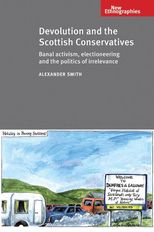 Devolution and the Scottish Conservatives: Banal Activism, Electioneering and the Politics of Irrelevance
Devolution and the Scottish Conservatives: Banal Activism, Electioneering and the Politics of Irrelevance
Contents
-
-
-
-
-
-
Hybrid knowledge Hybrid knowledge
-
Dispelling Doonhamers Dispelling Doonhamers
-
A good mix A good mix
-
The numbers game The numbers game
-
Notes Notes
-
-
-
-
-
-
-
-
3 Dispelling Doonhamers: naming and the numbers game
Get access-
Published:May 2011
Cite
Abstract
This chapter examines the evidence presented to a public inquiry convened in November 2002 during the Fifth Periodic Review of Parliamentary Boundaries in Scotland, exploring the political struggle between local Tories and their opponents over an apparently banal form: electoral boundaries. Although this inquiry concerned proposals to redraw Westminster constituencies that would otherwise have had little (if any) impact on elections to local government and the Scottish Parliament, it became a major focus for political activists in the months prior to the Scottish Parliament elections. Local Labour Party activists and their allies, for instance, feared that through the Boundary Commission's strict application of the electoral quota, or by playing ‘the numbers game’, an identity neatly encapsulated in the name attributed to natives of Dumfries (Doonhamers) would be lost. The chapter goes on to ask what activists in the region meant when they described a proposed new parliamentary constituency in southern Scotland as ‘a hybrid unit’ made up of disparate parts that did not belong to the whole.
Sign in
Personal account
- Sign in with email/username & password
- Get email alerts
- Save searches
- Purchase content
- Activate your purchase/trial code
- Add your ORCID iD
Purchase
Our books are available by subscription or purchase to libraries and institutions.
Purchasing information| Month: | Total Views: |
|---|---|
| April 2023 | 1 |
| May 2024 | 3 |
| August 2024 | 2 |
| March 2025 | 1 |



Get help with access
Institutional access
Access to content on Oxford Academic is often provided through institutional subscriptions and purchases. If you are a member of an institution with an active account, you may be able to access content in one of the following ways:
IP based access
Typically, access is provided across an institutional network to a range of IP addresses. This authentication occurs automatically, and it is not possible to sign out of an IP authenticated account.
Sign in through your institution
Choose this option to get remote access when outside your institution. Shibboleth/Open Athens technology is used to provide single sign-on between your institution’s website and Oxford Academic.
If your institution is not listed or you cannot sign in to your institution’s website, please contact your librarian or administrator.
Sign in with a library card
Enter your library card number to sign in. If you cannot sign in, please contact your librarian.
Society Members
Society member access to a journal is achieved in one of the following ways:
Sign in through society site
Many societies offer single sign-on between the society website and Oxford Academic. If you see ‘Sign in through society site’ in the sign in pane within a journal:
If you do not have a society account or have forgotten your username or password, please contact your society.
Sign in using a personal account
Some societies use Oxford Academic personal accounts to provide access to their members. See below.
Personal account
A personal account can be used to get email alerts, save searches, purchase content, and activate subscriptions.
Some societies use Oxford Academic personal accounts to provide access to their members.
Viewing your signed in accounts
Click the account icon in the top right to:
Signed in but can't access content
Oxford Academic is home to a wide variety of products. The institutional subscription may not cover the content that you are trying to access. If you believe you should have access to that content, please contact your librarian.
Institutional account management
For librarians and administrators, your personal account also provides access to institutional account management. Here you will find options to view and activate subscriptions, manage institutional settings and access options, access usage statistics, and more.